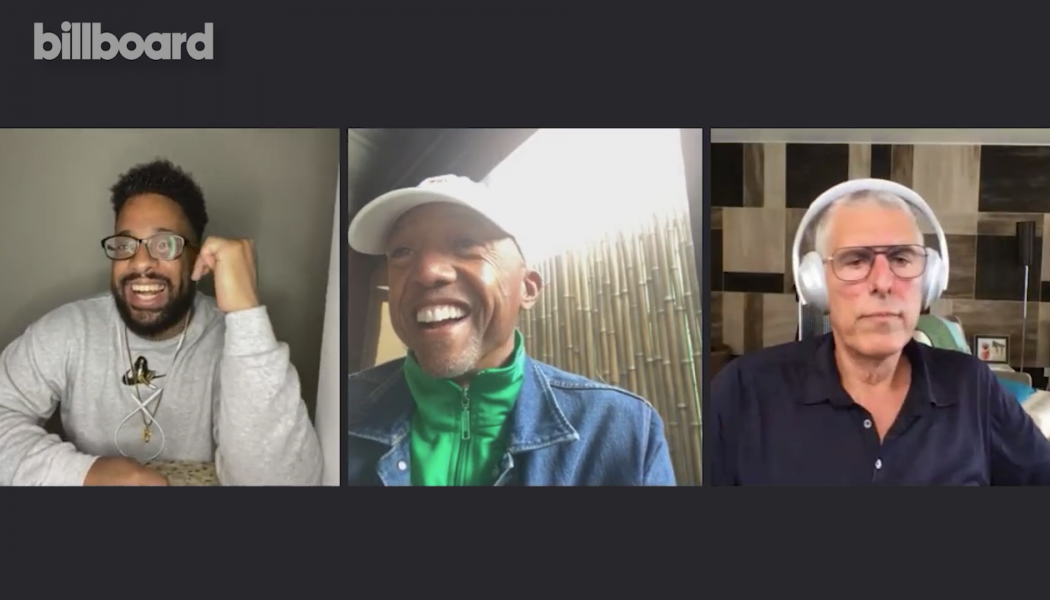
After signing to Def Jam in 1997, The Darkman blazed through the hip-hop sphere like a raging fireball, torching every feature he appeared on. From LL Cool J’s “4, 3, 2, 1 (Remix)” to The LOX’s “Money, Power, Respect,” X scarfed down every appearance with ease. The main course arrived a year later when he unleashed his seminal debut album, It’s Dark and Hell Is Hot. Stacked with hard-hitting bangers, X’s electric flows reminded listeners that New York hip-hop hadn’t lost its edge, and that the rapper born Earl Simmons was ready to be the cornerstone of this new style. It’s Dark and Hell Is Hot rocketed to No. 1 on the Billboard 200 — the first of five consecutive DMX projects to do so.
“I think everyone was tired of the technicolor, and wanted something more real and down-to-earth. It resembled a life they know,” relays Lyor Cohen, global head of music at YouTube. His former partner, Kevin Liles, seconds his stance and says X’s attachment to the streets is what brought his fans closer together during his apex. “I truly believe he wasn’t just a rapper,” the CEO and founder of 300 Entertainment explains. “He was a minister, and someone put here at that particular time to be a voice of the unheard,
In a roundtable-style discussion, Billboard caught up with Cohen and Liles to discuss the legacy of DMX, his impact on the label, and where he stands as an all-time great.
What was the state of Def Jam before DMX came into the picture?
Cohen: I don’t remember the state of Def Jam, but I do know the state of me. I had already talked to a lot of the people that I worked with that I didn’t know if I could contribute anymore. Especially since Puff and Bad Boy were dominating the airwaves. Bad Boy, at that time, was all about aspirational, high technicolor, Versace, and Rolls Royces [style of raps]. Def Jam’s architecture is black-and-white, with shades of grey. For me, I was contemplating retirement at the time. There’s nobody who could compete with Puffy when it comes to technicolor and aspiration.
When Irv [Gotti] invited me to go to Yonkers and I met [DMX], I remembered one of the things we really enjoyed doing was get really quick photos hoots of artists we’re interested in. That’s just to see if the magic of what we thought the artist was could be captured by a camera. I remember [Jonathan] Mannion delivering me a Polaroid of the shoot — and it was at that moment, I realized there was more [for us to contribute] –because it was a black-and-white photo, and it was just when Puffy released The Lox and put The Lox in technicolor and happy-dappy s–t. At that moment, I knew that the common person who wasn’t thinking about Versace suits or just Timbs, shades of grey and the reality of their struggle came into play. That was a real moment that I remember.
Kevin Liles: Here, I’m the young kid at that time, and they trusted me to be the president — and Lyor told me I was going to Yonkers with him and Irv. You see this kid come out with his jaw all wired up, and him tearing everyone out the frame. When we went to the studio, it was the house/studio with probably 30 people in there, and everyone was going at it. It was like a dog fight. Even with his wired mouth, X was so special.
What was missing [for Def Jam], was the point-of-view from the guy they don’t have… X not only brought an evolution, but a revolution of that point-of-view. It embodied the spirit of the unheard and unwanted, that didn’t even get in the club. It was a different time for us.
When you guys watched him freestyle with his mouth wired shut, what was going through both your minds? Did you guys see that superstar potential there?
Lyor Cohen: I’d like to say that if my mother was in the room, she’d pull me aside and tell me, “That’s the one.” It was so obvious that you didn’t need to be an expert. The molecules in the room changed. All the other rappers ran like cockroaches to light. It was night-and-day. We were waiting there for over an hour. We didn’t know what we were there for, but when he walked in, we realized precisely what we were there for.
Kevin Liles: Irv could’ve brought him to the office, but Irv wanted us to see him in his element. X was telling us he had something to say, even though his mouth was shut. From the sweat and everything that it took for him to do it, you couldn’t leave the room without saying, “Who’s that?” That’s a very deep memory that’s clear on what he was at that particular time.
Was there any trepidation of with how the public would receive this kind of energy in rap?
Lyor Cohen: No — we actually knew they were starved for it, like we were starved for it. We didn’t know the extent they were famished, but for someone to ring the bell the way he did, the pendulum swings all the way to its furthest side until it comes back. I think everyone was tired of the technicolor, and wanted something more real and down-to-earth. It resembled a life they know.
Kevin Liles: I remember the first time we saw Run-DMC in the black jackets and adidas and being like, “Oh, they’re like me.” I remember the first time hearing “Sucker MCs,” it was that kind of moment when X was there. How could you be afraid of the truth? How could you be afraid of it being dark and someone showing you the light? How could you be afraid of someone saying It’s Dark and Hell Is Hot? You want to empower that, because he wasn’t just speaking for himself.
He releases five straight No. 1 albums and two within the same calendar year. Were you guys surprised by that outcome?
Lyor Cohen: Once it kicked off, I wasn’t surprised. I always kind of knew it was a race against time. The more thoughtful, loving and rational person was Earl Simmons, and the key in my mind was — how do we let Earl Simmons know that he’s valued and people care about him? When fans saw him, they wanted X. I think the issue was Earl didn’t know how to survive as DMX became more famous.
Earl didn’t find a place in that. Earl didn’t have the time to be recognized. So the race against time was, X was a gremlin, reckless and looking for a wall to crash into. His death is no surprise if you listened to and watched what X was. I think it’s a tragedy, because I wish people knew Earl the fisherman, who loved to be with his kids and talk about deep things. He was curious about the world and interested in other people’s opinions.
Kevin Liles: One of the great things about him, [he’s somebody] that’s given to us and cares about us more than himself. He wanted to be what the people needed him to be. You think about Martin Luther King Jr., who was a pastor and never said I’m gonna lead, or Malcolm X, who was a pimp and hustler with a different point of view, and you go down to any of the great leaders… they didn’t know. X knew he got more enjoyment out of life by serving others.
When you constantly hear people saying, “We want X,” you give them a debt of service. He was really praying that he could give us what we needed to live our lives. Now imagine the energy it took for a man to speak for tens of millions of people. The energy of a man to always have to be on and not off. I believe he was put here for a purpose. I think the albums and being No. 1 at the time were purposeful. I wish that there was more that we could do or say to change the outcome, but I think that was written also.
I was always curious about the acting aspect because he seemed so natural at it. Did you guys get an inkling about what he was capable of doing on the big screen?
Kevin Liles: What’s so crazy is X wasn’t acting. X was being X, and we gave him parameters about X-Y-Z — but he could still be X. So he could still be X within these parameters. X never acted, in his real life or in a film. X was just X. If you cut him open, that was X. You can’t put that into a script. There was no controlling him not being X. That’s who he was and that also was written.
Lyor Cohen: I did not believe he could act. I didn’t like rappers acting. I hated Hollywood. Hollywood did a lot of greasy things to a lot of our artists over the years. I have to say, it takes a crazy person like Joel Silver or Hype [Williams] to recognize the talent and direct the talent in that sort of way. Big kudos to Joel Silver and Hype for being able to get the most out of X as an actor.
I’ve been grappling with X’s legacy, not only just in hip-hop but also with Def Jam overall. Where do you guys feel like he stands with Def Jam all-time greats? The stats are there.
Lyor Cohen: I’m not interested in ranking or talking about a pantheon. I do know that X was critical to Def Jam’s survival. I would even say that for the many years that Def Jam has fallen into disrepair, the power of what X has done has given it more battery life to find itself and its own resurrection. He’s the only real rock-and-roll rapper that I ever met. When I talk about rock-and-roll, it’s someone who is so deep in their art and tormented at the same time — but he made an X on all of our hearts.
Kevin Liles: We never dealt with hierarchy. We just wanted to put the best player at the best time on the field to play the game. X was definitely one of those players. Three seconds left and we could win the game, I’m definitely throwing him the ball. What you had with Def Jam, it wasn’t a label — it was culture, and X was the epitome of what culture was at that time. We all lived it at different iterations in our life for those moments. Run-DMC was that. LL Cool J was that — and then you came with X and JAY-Z. All these artists came during a different period of time to tell what the world was.
So to put a hierarchy on it, I think that’s the wrong thing — because hip-hop grew up. What changes a brand is that one creation, and we’re just thankful he came into our lives. We all have that X in our hearts, minds, body, and soul. To the Simmons family, Irv, his fiancée, ex-wife, and kids, our love and prayers will always be there.







![Truuuuu: 2 Chainz Flexes Trappy Bars On ‘The La Leakers’ Show Freestlye [Video]](https://www.wazupnaija.com/wp-content/uploads/2022/02/truuuuu-2-chainz-flexes-trappy-bars-on-the-la-leakers-show-freestlye-video-327x219.jpg)


